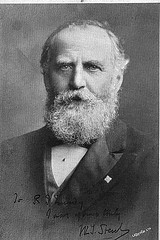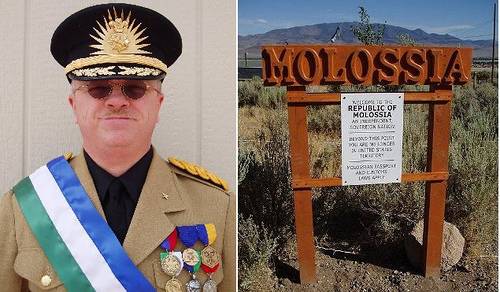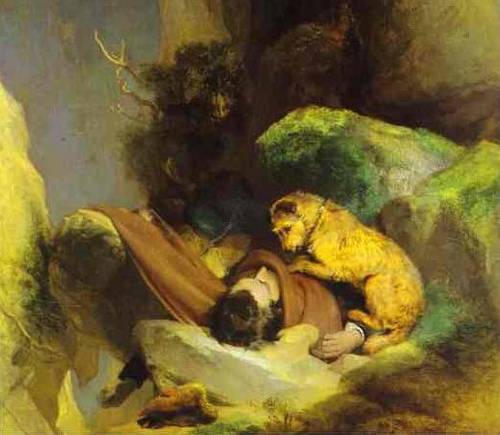dromaeognathous
adj. having a palate like an emu
Vindicated

As a writer, W.T. Stead may have been too prescient.
In 1886 he published an article about the sinking of an ocean liner and the consequent loss of life, warning, “This is exactly what might take place and will take place if liners are sent to sea short of boats.”
Six years later he wrote a novel, From the Old World to the New, in which a ship collides with an iceberg in the North Atlantic and sinks; the survivors are picked up by the Majestic, a ship of the White Star Line.
An outspoken newspaper editor, Stead himself embarked for the New World in April 1912 when President Taft invited him to address a peace conference at Carnegie Hall.
Alas, he never arrived — he had booked his passage on the RMS Titanic.
Spellbound
‘Well, it was a quite shocking, I must say — there was blood everywhere!’ Alfred Hitchcock began suddenly from the rear of the elevator. We were in the New York St. Regis Hotel, heading down to the lobby. There was as light flush to his cheeks from the several frozen dauquiris he had just drunk in his suite. The elevator had just stopped and three people dressed for the evening had joined us, and immediately Mr. Hitchcock had started to speak, sounding as though he were in midsentence and projecting in that careful and familiar TV tone of his.
He went on, ‘There was as stream of blood coming from his ear and another from his mouth.’ The people had recognized him immediately, but now they seemed purposely to avoid looking at him. He went right on, gazing beatifically ahead of him as the elevator stopped again and another well-dressed couple came aboard: ‘Of course, there was a huge pool of blood on the floor and his clothes were spattered with it — Oh, it was a horrible mess.’
No one on the elevator, it seemed, was breathing. ‘Blood all around! Well, I looked at the poor man and and I said, “Good God, what happened to you?”‘ At that point the elevator doors opened onto the lobby, and Hitchcock said, ‘Do you know what he told me?’ and then paused. After a moment, and quite reluctantly, the other passengers moved out of the elevator and then looked back at the director as we walked away.
After several foggy moments, I asked, ‘Well, what did he say?’ and Hitchcock smiled benevolently, taking my arm, and said, ‘Oh, nothing — that’s just my elevator story.’
— Peter Bogdonavich, Who the Devil Made It, 1997
Freak Winds
Feb. 7, 1988, was a normal day in Lancashire until 10 p.m., when an anemometer at the Hazelrigg weather station registered a single wind gust of 106 mph. Immediately afterward, the winds dropped back to 5 mph.
The squall was tiny but real — investigators discovered that it had moved a 75-kilogram sheep feeding trough a distance of 5.1 meters.
On June 15, 1960, a collapsing thunderstorm blasted Kopperl, Texas, with 75-mph gusts of superheated air that raised the temperature to 140 degrees Fahrenheit, fully 20 degrees above the state’s all-time record. It’s remembered as “Satan’s storm.”
It’s Good to Be King

Kevin Baugh looks pretty happy, doesn’t he? Well, you would be, too — Kevin is president of the independent micronation of Molossia, an acre of Nevada desert that he claimed as an independent republic in 1999.
Molossia has a population of 3; its inhabitants speak English and observe Molossian Standard Time, which is 7 hours 29 minutes behind Greenwich. The local currency is the Valora, which equals a partial tube of Pillsbury cookie dough.
The nation’s capital, Espera, surrounds the Baugh residence near Dayton, Nevada. Tourism has reached 10 visitors a year, but you have to surrender your pocket change at the border, and you can’t bring any firearms, incandescent light bulbs, catfish, onions, walruses, or “anything from Texas except Kelly Clarkson.”
Its motto is “Nothing Ventured, Nothing Gained.”
“O-U-G-H”
I’m taught p-l-o-u-g-h
Shall be pronouncé “plow.”
“Zat’s easy w’en you know,” I say,
“Mon Anglais, I’ll get through!”
My teacher say zat in zat case,
O-u-g-h is “oo.”
And zen I laugh and say to him,
“Zees Anglais make me cough.”
He say, “Not ‘coo,’ but in zat word,
O-u-g-h is ‘off.'”
Oh, Sacre bleu! Such varied sounds
Of words makes me hiccough!
He say, “Again mon frien’ ees wrong;
O-u-g-h is ‘up’
In hiccough.” Zen I cry, “No more,
You make my t’roat feel rough.”
“Non, non!” he cry, “you are not right;
O-u-g-h is ‘uff.'”
I say, “I try to spik your words,
I cannot spik zem though.”
“In time you’ll learn, but now you’re wrong!
O-u-g-h is ‘owe.'”
“I’ll try no more, I s’all go mad,
I’ll drown me in ze lough!”
“But ere you drown yourself,” said he,
“O-u-g-h is ‘ock.'”
He taught no more, I held him fast,
And killed him wiz a rough!
— Charles Battell Loomis
Unquote
“It is difficult not to write satire.” — Juvenal
Indie Roc
Excerpts from Midwestern newspapers, April 1948:
BELVIDERE, Ill. – (UP) – A farmer and a truck driver reported today that they had seen a bird ‘bigger than an airplane.’ … The giant bird was reported by Robert Price and Veryl Babb. Price said he saw it while working near his barn on his farm near Caledonia, Ill. … He said it had a long neck and ‘what I suppose were its feet trailing behind it.’ … Babb, a Freeport, Ill., truck driver, reported seeing the bird at a different location on the same day. … ‘When I spotted the thing it was coasting. It was bigger than an airplane and reminded me of one of those prehistoric monsters I learned about when I was in school.’
ST. LOUIS – (UP) – A retired Air Force colonel and a 12 year-old boy last night backed up the report by two Belvidere, Ill., residents of spotting a ‘monster bird.’ … ‘At first I thought there was something wrong with my eyesight,’ [Col. W.F.] Siegmund said. ‘But it was definitely a bird, and not a glider or jet plane.’ He described the creature as about the size of a small pursuit plane and said it was flying northeast at an altitude of between 4,000 and 5,000 feet. … The Trares boy said he spotted the bird in the air one evening at sunset and ran yelling into his house to tell his mother. He said it was gray-green in color and about the size of an airplane.
ALTON, Ill. – (UP) – An ‘enormous’ bird, first reported sighted two weeks ago, was seen flying over the outskirts of Alton shortly before noon yesterday. E.M. Coleman, a former salesman, and his 5 year-old son, James, said the bird was flying at about 500 feet and ‘cast a shadow the same as that of a Piper Cub at the same height.’ Coleman said it was an ‘enormous, incredible thing with a body that looked like a naval torpedo.’
Curiously, flying monsters have been reported in that area for more than 300 years.
The Dog of Helvellyn

On April 17, 1805, artist Charles Gough set out to walk over Helvellyn, a mountain in England’s Lake District, with his dog, Foxie. He never returned. Three months later, on July 27, a shepherd heard barking high on the mountain’s flank, at about 2,300 feet, and discovered Foxie beside her master’s body.
It appeared that Gough had fallen to his death, and the dog had remained by his side for three months. How she had survived up there remains a mystery — she had even borne a puppy, which was found dead in a burrow dug into the mountainside. The episode captured the Romantic imagination, and Wordsworth, Edwin Landseer, and Walter Scott all paid tribute to Foxie’s loyalty:
How long did’st thou think that his silence was slumber!
When the wind waved his garment how oft did’st thou start!
But I can find no record of what became of her.
Bonus dog-loyalty-overtime stories: New Mexico, Montana, Tokyo.
“Indifference”
The cat is in the parlour,
The dog is in the lake;
The cow is in the hammock,–
What difference does it make?
Anthologist Carolyn Wells calls this “immortal”; I am inclined to agree. No one knows who wrote it.
